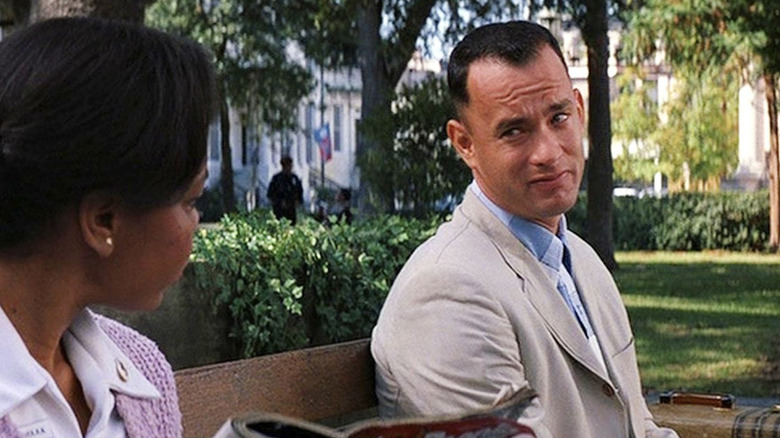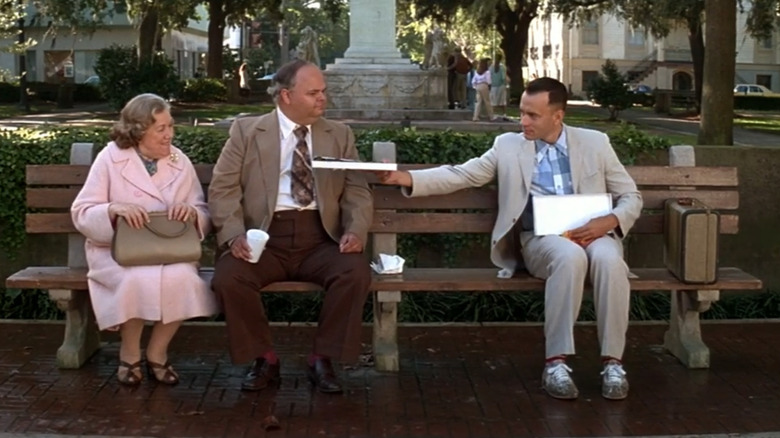Why Tom Hanks Had Serious Doubts That People Would Care About Forrest Gump
"Life [is] like a box of chocolates, you never know what you're gonna get" is an unforgettable line from the unforgettable film "Forrest Gump." The adage, which gives a surprisingly enlightened view of accepting what life hands you, is not spoken by a philosopher or a pseudo-intellectual know-it-all. It's spoken by Tom Hanks' Forrest Gump, a man with an IQ of 75. He's the film's titular hero, and he has become one of the actor's most beloved roles.
The movie premiered in 1994 and follows the unlikely adventures of Hanks' Forrest. The simple-minded guy unwittingly finds himself in the background of key events in American history, becoming a decorated war veteran, a ping-pong champion in China, and, eventually, a millionaire. "Forrest Gump" took nearly a decade to get made because, as producer Wendy Finerman told the New York Times, "actors, directors, agents, studio people were just not interested in the project." She said that it was most likely due to "Rain Man"; the New York Times wrote that Warner Brothers thought that film "somehow reduced the commercial viability" of "Forrest Gump."
"Forrest Gump" was, of course, made and has gone on to become iconic for more than just the "box of chocolates" line. The production was not without its difficulties, however — and even Hanks had doubts about the content.
Tom Hanks had his doubts about Forrest Gump
During the 25th anniversary of "Forrest Gump," Tom Hanks told USA Today about his experience during the film's production. Hanks characterized the film as "an absolute crapshoot," calling it a "really crazy, unique motion picture." At the time of filming, Hanks had some serious doubts about the character's narration, worrying that it wouldn't resonate with audiences. "Is anybody going to (care) about this?" Hanks remembered asking director Robert Zemeckis. The bus stop scene starts off the movie with Forrest talking to an uninterested nurse who comes to sit at the bus stop. That location is a narrative anchor throughout Gump's story and the film.
Hanks also talked about the scene with the ReelBlend podcast in June (via CNN): "I will tell you, in 'Forrest Gump,' all the stuff that we shot on the park bench in Savannah, Georgia ... we were just shooting fodder for a possible narrative piece of it." Again, Hanks asked Zemeckis if anyone was going to care about "this nut" on a bench, which entailed 13 pages of dialogue filmed over a day and a half. But Zemeckis stuck to his guns, telling Hanks, "I don't know, it's a minefield, Tom, it's a minefield. You never know what people are gonna take away from it."
And just like pulling a creamy, caramel-centered candy from a box of chocolates, they got a keeper of a scene.
Tom Hanks helped fund Forrest Gump
As the New York Times wrote in 1994, "bringing the baby to life was arduous." Wendy Finerman was "floored" when she discovered the story of "Forrest Gump," based on a novel of the same name by Winston Groom, and had to get it made. As stated before, she experienced a lot of pushback from studios, but Paramount Pictures finally signed a deal to make the movie on a $40 million budget. However, that wasn't the end of production troubles.
One of the bigger issues to plague production was the budget. As Tom Hanks told "In Depth with Graham Bensinger" in 2020, Paramount didn't want to pay for the costly sequence of Forrest running across America. Director Robert Zemeckis (and Hanks) didn't want to see the scene go — Forrest's simple perspective on the world and how it impacted his life is visually represented by his run across America. Forrest was known for running; it saved him from childhood bullies, got him a football scholarship to the University of Alabama, and even helped him in the war. It was a major theme throughout the movie, and its inclusion is a fitting climax leading into the emotional reveal of his son.
Eventually, Zemeckis and Hanks helped fund the scenes themselves. This meant they would split the cost of the run as well as filming insurance on some shoots later on (which Paramount also refused to cover). In exchange, Hanks had final say on cuts of the film and both would gain profit-sharing on whatever the movie made at the box office. It was a wise move on the actor's part: IndieWire reported that Hanks earned about $65 million in profits from the film.

